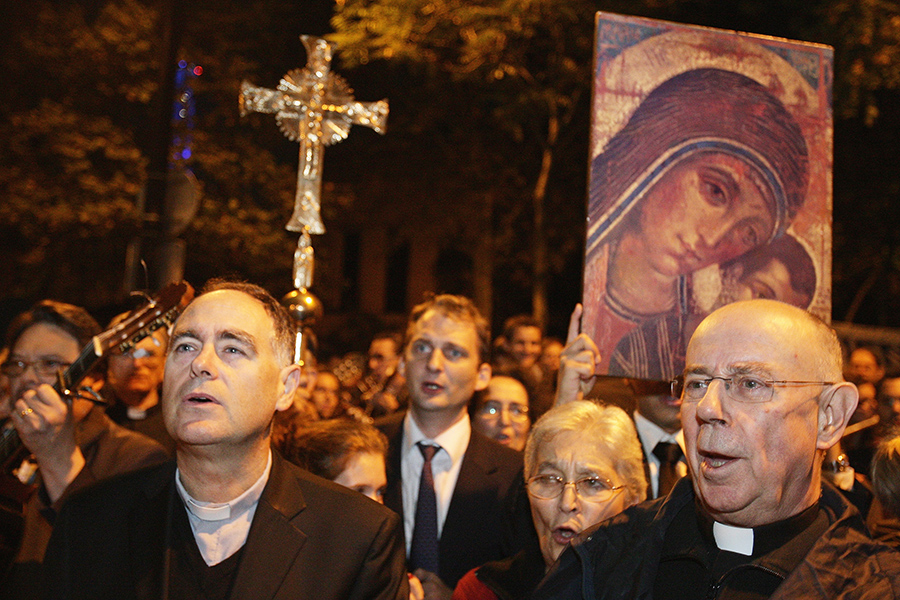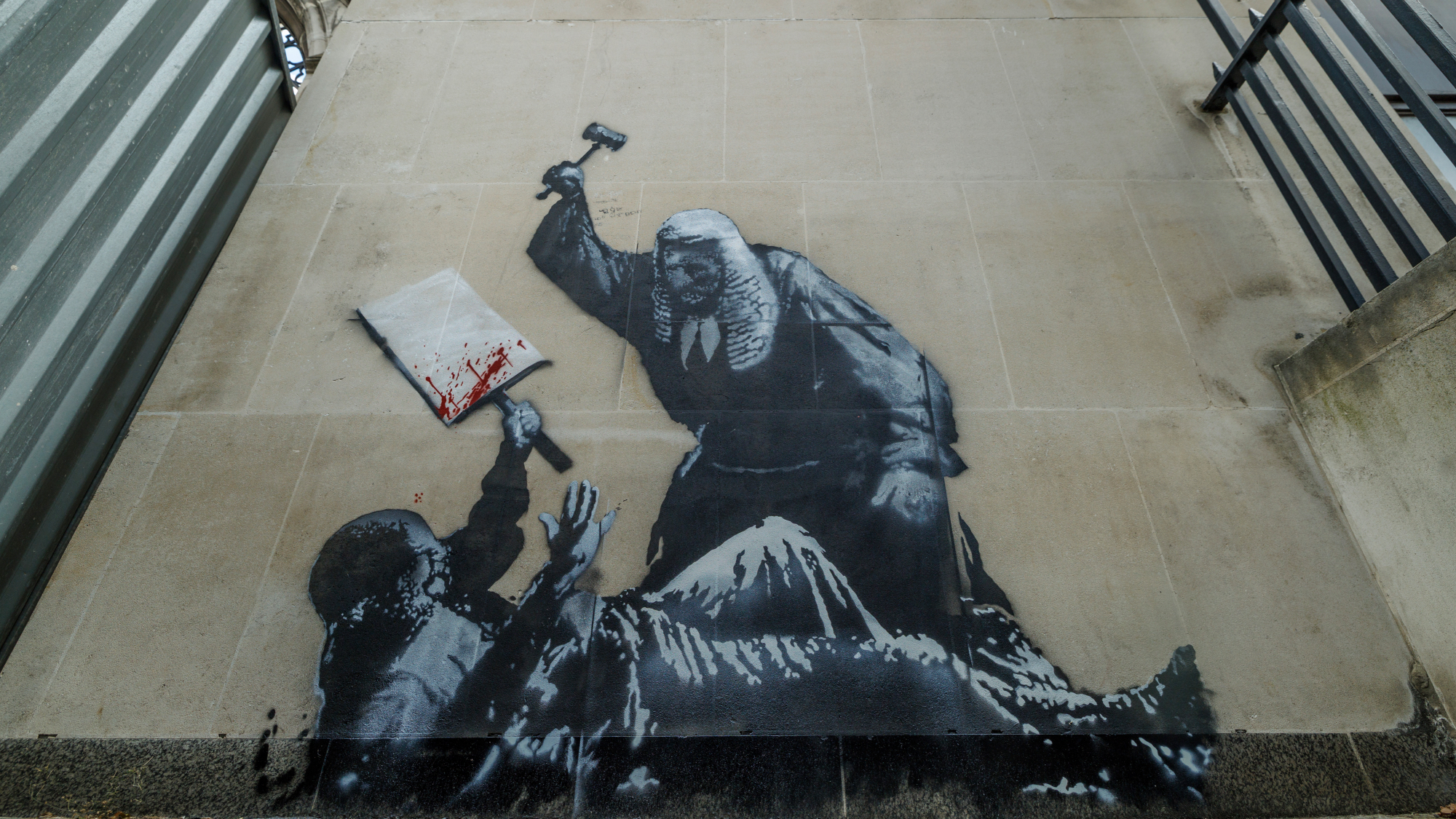Is there a Christian revival starting in France?
An unexpected movement is growing in French cities


On a recent Sunday, my family and I only showed up 10 minutes early for Mass. That meant we had to sit in fold-out chairs in the spillover room, where the Mass is relayed on a large TV screen. During the service, my toddler had to go to the bathroom. To get there, we had to step over a dozen people sitting in hallways and corners. This is business as usual for my church in Paris, France.
I point this out because one of the most familiar tropes in social commentary today is the loss of Christian faith in Europe in general, and France in particular. The Wall Street Journal recently fretted about the sale of "Europe's empty churches."
Could it be, instead, that France is in the early stages of a Christian revival?
The Week
Escape your echo chamber. Get the facts behind the news, plus analysis from multiple perspectives.

Sign up for The Week's Free Newsletters
From our morning news briefing to a weekly Good News Newsletter, get the best of The Week delivered directly to your inbox.
From our morning news briefing to a weekly Good News Newsletter, get the best of The Week delivered directly to your inbox.
Yes, churches in the French countryside are desperately empty. There are no young people there. But then, there are no young people in the French countryside, period. France is a modern country with an advanced economy, and that means its countryside has emptied, and that means that churches built in an era when the country's sociological makeup was quite different go empty. In the cities — which is where people are, and where cultural trends gain escape velocity — the story is quite different.
But back to our parish. Is our pastor some outlier with megawatt charisma? In terms of flair, he would win no public speaking contests. But there is something that sets him apart from many of the Catholic priests my parents' generation grew up listening to: he is unapologetically orthodox. He is tactful, but unafraid to talk about controversial topics. He will talk about a lackadaisical approach to the liturgy being a kind of unfaithfulness to God. A few weeks ago, I even got to see something for the first time in my life: a Catholic priest preaching about Hell.
But there is no rigoristic hectoring at our parish. Our pastor will stress the importance of living in accordance with the Church's rules, and in the same breath say something like: "Is the real problem in the Church people who are divorced and remarried, or people who are homosexual? No, the real problem is people who go to church every Sunday and are not willing to see everyone as a child of God, are not willing to welcome them." It is the kind of approach modeled by Popes John Paul II and Francis: a Catholicism that is both doctrinally robust and joyfully welcoming.
This is not an isolated phenomenon. My wife and I now live in an upper-crust neighborhood with all the churches full of upwardly-mobile professionals. When we were penniless grad students, we lived in a working class neighborhood and on Sunday our church was packed with immigrant families and hipster gentrifiers.
A free daily email with the biggest news stories of the day – and the best features from TheWeek.com
It was only recently that I was struck by the fact that, imperceptibly, the majority of my college and grad school friends who were Christmas-and-Easter-Catholics when we met now report going to Church every Sunday and praying regularly. On social media, they used to post about parties; now they're equally likely to post prayers for persecuted Middle East Christians or calls to help the homeless over the holidays.
My friends live all over town; some of them are young singles who move around a lot; all of them report looking for those mythical "empty churches" we hear so much about — and failing to find them. In fact, it's closer to the other way around: If you don't show up early, you might have to sit on the floor — and people are happy to do it.
Of course, the key benchmark for a real religious revival is priestly vocations. The test of a people's fervor is how many of them are willing to pursue a life of celibacy and thankless service for the sake of the Kingdom. But it's a lagging indicator: the move from finding a robust faith to joining the priesthood takes time. But even there, things are looking up.
Vocations have stabilized for some time now and have been showing slow but steady growth for years. The Community of Saint Martin, a congregation started in the 70s by just one priest, whose members pray in Latin using the new, post-Vatican II Missal — making them suspect to both the traditionalist wing of the Church, who distrust the New Missal, and the progressive wing, who dislike the use of Latin — now has one of the biggest seminaries in the country. And, so to speak, quality has a quantity all of its own: One talented priest will turn around a parish when 10 mediocre ones just occupy space. The people of the so-called "John Paul II Generation," who have been through the crucible of all those anti-religious trends we've read so much about, who choose the priesthood nonetheless, have a fervor that was too often lacking in previous generations.
I don't deny that much of my evidence for a revival is anecdotal; but, well, first, I'm a pundit, so you're dreaming if you think I'm going to let that stop me; and second, if there was a revival starting, wouldn't that be how you would notice it before it showed up in the numbers?
The massive rallies in France, underwritten by the Catholic Church, against the recent same-sex marriage bill stunned the world: Isn't France the poster child for sexually-easygoing secularism? Perhaps more than a million people took to the streets, and disproportionately young ones, too. (Compare Britain's "whatever" response to its own same-sex marriage act, passed around the same time.) But they forgot that a century of militant secularism didn't kill the Old Faith — it merely drove it underground. And perhaps by privatizing faith, the secularists unwittingly strengthened it; after all, the catacombs have always been good to Christianity. Many commentators on both sides have described the protests as a kind of "conservative May 68," after the generation-defining student protests that would go on to seize the levers of power. Infamously, an unwritten rule of French politics for the past 50 years has been that mass protests will kill a government bill even if it has a majority in Parliament and in the polls. Many fret (and some relish) that the government making an exception just for social conservatives only radicalized them further.
Nowadays, the perceptive and troublemaking French writer Michel Houellebecq is making noises with his book Submission, which envisions France turning into an Islamic theocracy in the near future — not chiefly because of immigration from Muslim countries, but because of the conversion of the native-born population. The agnostic Houellebecq's book is Christ-haunted, or perhaps more accurately, Christianity-haunted. The book's protagonist, an allegory of France, and, perhaps, the author, is fascinated by the figure of Joris-Karl Huysmans, a 19th century French author who converted from a life of atheistic hedonism to devout Catholicism. The protagonist is exhausted by the spiritually dead consumerist secularism of his culture — so exhausted that even despite his best efforts, he finds himself unable to believe in the faith of his forefathers, and only turns to Islam, as it were, as the last available option.
Houellebecq's genius has always been at tapping the French zeitgeist where it hurts. The Catholic writer Barbey d'Aurevilly had been so struck by young Huysmans' decadent novel À rebours that he declared Hysmans' options were "the barrel of a gun or the foot of the cross," suicide or Catholicism. Houellebecq's novel has France choosing what seems to be, from his perspective, the first option. Incredibly, perhaps France is instead choosing the second.
The tragic Charlie Hebdo attack has thrown into relief what seems to some, like Michel Houellebecq, as the battle between irreligiosity and Islam for the future of France. Nobody seems to envision that France's future instead just might be some of that old-time religion.
Pascal-Emmanuel Gobry is a writer and fellow at the Ethics and Public Policy Center. His writing has appeared at Forbes, The Atlantic, First Things, Commentary Magazine, The Daily Beast, The Federalist, Quartz, and other places. He lives in Paris with his beloved wife and daughter.



